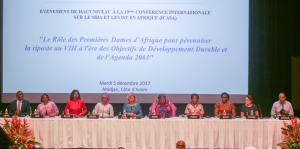WHO lauds African First Ladies for their prominent role in tackling Mother to Child Transmission of HIV
Abidjan, December 5, 2017 – The important role of the Organization of African First Ladies against HIV and AIDS (OAFLA) in Ending Mother-to-Child Transmission of HIV has been under discussion at a special session organised by the World Health Organsiation and OAFLA on the margins of 19TH International Conference on AIDS and Sexually Transmitted Infections in Africa (ICASA).
ICASA was officially opened by Cote d’Ivoire President, Alassane Ouattara yesterday who committed $31 million of his Government’s budget towards the fight against HIV for the period 2018 to 2020. He said Cote d’Ivoire was on course to reducing the HIV prevalence rate from 2.7 % to a percentage by 2020. President Ouattara called for concerted efforts by all partners including WHO and UNAIDS for sustained funding to reach out to populations in the African region particularly children and adolescent.
The issue of reducing infections in and providing treatment for children and adolescents has been a rallying call at ICASA in several sessions held, and WHO Regional Director for Africa Dr Matshidiso Moeti underpinning this aspect when she gave the keynote address at the OAFLA opening ceremony this morning. Dr Moeti said that the trend of HIV infections among adolescents is still rising. She said 73% of these young people live in sub-Sharan Africa, with the majority of them young women, thus making the role of African First Ladies even more significant.
“Our distinguished First Ladies work on both policy and service delivery level, and they are key to driving initiatives that can strengthen tacking HIV. As mothers, parents and educators, their collective efforts have contributed greatly to the fight against HIV and we are seeing unprecedented political support,” said Dr Moeti.
The high level OAFLA meeting led by Madame Dominique Ouattara and attended by the First Ladies of Niger, The Republic of Congo, Benin, The Gambia as well ad Guyana and Belize, reviewed success achieved in the fight against mothers to child HIV transmission. Their engagement this fight has been critical, especially in the countries in which the HIV/AIDS epidemic has hit hardest. Through education campaigns, policy reform, and awareness-raising events, First Ladies have had had profound impact on the lives of children, adolescents, women and families affected by HIV.
Madam Ouattaara stated: “This challenge is not an easy one and illustrates the distinguished work of our First Ladies as champions of ending the transmission of HIV by mothers to their children.”
Panels discussion this morning looked at progress made in Africa towards ending the AIDS epidemic especially among children, adolescents and women and increased community engagement towards elimination of mother-to-child transmission of HIV among other topics. The objective of the high level engagement is to reflect on the unique national, regional and global leadership role that African First Ladies play in the fight against HIV and highlight prevailing challenges, lessons learnt and opportunities that will inform future actions of the First Ladies within the context of Agenda 2063 and the Sustainable Development Goals (SDGs).
Although there has been a 50% decline in new infections globally, it is estimated d that it is 2.1 million children (0-14) and 1.2 million adolescents (15-19) are living with HIV. The target is to provide additional antiretroviral therapy to 1.6 million children by 2018.
There is strong level of collaboration and engagement between WHO and international and national partners in health ministries and other stakeholders. Civil Society groups have also been making their voices heard at ICASA, with calls for updated data, more funding and access to treatment.
UNAIDS Executive Director Michel Sidibe alluded to current social economic factors such as migration, climate change, terrorism, technological advancements and downscaling of development assistance as issues to bearing mind in assessing combined approaches to tackling issues of HIV and AIDS,
The week long ICASA Conference, themed he conference themed “Africa: Ending AIDS-delivering differently” is being attended by over 7.000 of the world’s leading scientists, policy makers, activists, People Living in with HIV government leaders – as well as a number of heads of state and civil society representatives – to debate how to achieve success in dealing with HIV in Africa. Hundreds of delegates will also take part in a series of side events and meetings, focused on themes, whose objects will define the next programme of work by WHO, other Internationals organizations, health experts, partners and civil society in the next two years.
For more information please contact
Dr Françoise Bigirimana
Medical Officer – PMTCT
Family and Reproductive Health
WHO Regional Office
Mobile: +242 068769595
Email: bigirimanaf [at] who.int (bigirimanaf[at]who[dot]int)



